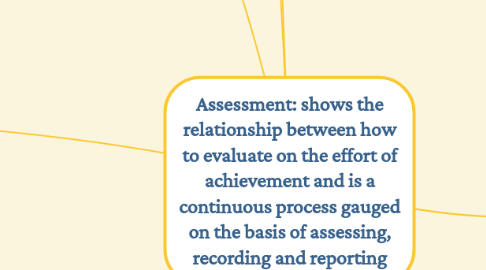Assessment: shows the relationship between how to evaluate on the effort of achievement and is a continuous process gauged on the basis of assessing, recording and reporting
by Safina Ahsan


1. Reflection and initiated action of the inquiry
2. Parent-learner-facilitator meeting to share knowledge about how the inquiry went and what changes could be done the next time. Reflection
3. Challenging yourself for extra effort through presentations, explorations, discoveries projects, etc.
4. Summative Assessment
4.1. This is the gained knowledge from the process of learning for applying it practically and acting on it.
4.2. This, again reconnects with both pre and formative assessments as this is the product made out of it.
4.3. Learners show different application of gained knowledge.
4.4. Moving further gaining knowledge
4.5. Collaborative review
4.6. Evidence for conclusion
4.7. What is being assessed and what is the creation for success?
4.8. Sharing knowledge
4.9. Mini exhibition to exhibit their understanding of the inquiry
5. Formative Assessment
5.1. This is an on-going process of learning, improvising and re-learning if needed.
5.2. The inquiry cycle leads to further investigations and detailing about what, when, how and why.
5.3. Moreover, making connections and retaining them.
5.4. This is a stage of realizing different aspects/ gathering of information linking to the theme, IB concepts, attitudes, skills and attributes.
5.5. At this stage, the learners connect on what they already know and how are they knowing more.
5.6. Feedback, peer evaluation and self-assessment
5.7. Modification in teaching and learning
5.8. Method of assessment
5.9. Reporting for assessment to be shared with learners and parents both for them to have an understanding how the learners will be evaluated i.e. through anecdotal records, rubrics, exemplars etc.
5.10. Collaborative session with parents to showcase the inquiry.
5.11. Open House student-led conferences for parents, friends, school to visit and discuss details about the inquiry.
6. Pre-Assessment
6.1. This is basically prior knowledge.
6.1.1. What we already know and how we know about it?
6.1.2. Visible thinking routines comes in here for understanding how well the learners know about it.
6.1.3. What is our basic understanding about it?
6.1.4. How can we link our prior knowledge to the theme we are doing?
6.1.5. How can our prior knowledge now relate to the IB essential elements (knowledge, concepts, skills, attitudes, attributes and development of action)?
6.1.6. Testing your prior knowledge by asking relevant questions and answering them.

